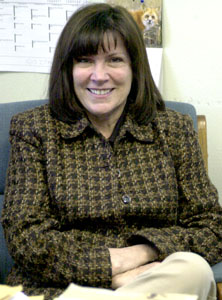Professor awarded for research and university contributions
The secret is out.
One of Utah State University’s award-winning professors isn’t gaining honor based solely on academic achievement, but for her striking good looks as well.
Who knew Beth Foley, 2004 teacher of the year and soon-to-be interim department head of the communicative disorders and deaf education department, was also awarded a $10,000 scholarship for her first place performance in a swimming suit competition at the age of 30?
“I told my mother all I lost was my dignity, but I did win some money,” she said. “I’m sure it will really be a surprise to my students to know I paid for my doctorate degree with the prize from a bathing suit contest.”
“At the time of the competition, I was a kindergarten teacher,” she said. “After the finals, one of my students came up to me and said, ‘Miss Foley, were you in a bikini contest last night? Because my dad says you were and he says you are fine!'”
However, Foley is much more than just a pretty face and should be commended for her contributions to USU and thousands of individuals.
Foley has been selected as the 2005 Utah Statesman professor of the year.
A Boston native, she completed her bachelor’s, master’s and doctorate at the University of Massachusetts and has worked as a professor in the department of communicative disorders and deaf education at USU for 12 years.
“I love teaching and I feel lucky to have a career that comes so naturally to me,” she said. “I feel so fortunate because the students here are great and I’ve really enjoyed the experience.”
Having received three degrees in communicative disorders, Foley’s specific area of research is literacy development for people with severe disabilities.
She said her work involves finding assistive technology that helps people do the things they need to do.
“I work a lot with electronic communicative devices for children who have problems with speech,” she said. “So I do a lot of consulting in local schools where the kids are in different programs to help their teachers know how to assist with their communication. It’s really fun.”
She currently teaches a year-long class in the assistive technology lab where students learn what technology is available for impaired mobility.
Once the students grasp the ideas, they meet people in Cache Valley with assistive technology needs.
The research doesn’t stop there. Assistive technology students go on to build the needed technology at their lab on campus.
“What I really love is seeing the students in this class make these things. They build adaptive beds and special chairs for kids,” she said.
“These are things you wouldn’t expect from a group of mostly young women until you see them with power tools and safety goggles.”
Michelle Stites, a junior in communicative disorders and deaf education, was in a car accident last October and needed the help of assisted technology in her recovery.
She said Foley was more than willing to help her get the support she needed.
“Professor Foley is really willing to work with and modify things for her students,” Stites said. “I haven’t had her as a professor, but I hear she is amazing.”
The satisfaction of seeing her students learn and grow is only one of the many perks of Foley’s career.
“Seeing these severely disabled children, who people often underestimate, in regular classrooms reading and learning along with the others is the most exciting and gratifying part of this job,” she said.
As an expert in her field, she has presented workshops in several countries and travels regularly throughout the United States training speech pathologists to improve the outcome of their students’ results.
Carol Strong, dean of the College of Education and Human Services, echoed the response of all those who have been associated with Foley.
“She is known as a charismatic teacher who uses her sense of humor to maintain the attention of an audience while presenting her points with humbling clarity,” she said.
“I’ve been in the audience on a number of occasions when she is teaching and admire her experience, speaking skills and presentation style.”
While it may not seem possible, Foley even has a life beyond that of an associate professor.
She spends her available time with her 4-year-old son, where she has learned to “see life through younger eyes.”
Over the years, Foley has influenced the lives of thousands of people with disabilities , becoming an important asset at USU.
-lexiek@cc.usu.edu

Dr. Beth Foley specializes in literacy development for people with disabilities. (Photo by Michael Sharp)

